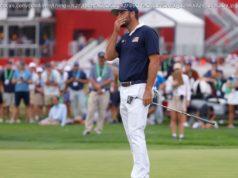The final curtain falls late Sunday on the “Greatest Show on Earth.”
The final curtain fell late Sunday on the Ringling Bros. and Barnum & Bailey Circus, known widely as “the Greatest Show on Earth.”
The circus, which traces its lineage back to showman P. T. Barnum’s traveling museum in the 1800s, performed its final show at the Nassau Veterans Memorial Coliseum in Uniondale, N.Y.
Ringling streamed the final show on its website and on Facebook Live, where at least 19,000 viewers watched at one point. One commenter remarked: “i remember seeing the Greatest Show on Earth as a little girl with my family. Thank you for all your hard work and all the joy you brought to us all.”
A second unit of the traveling circus closed this month in Providence, R. I.
The circus last January said it would end its run after 146 years. The move came as circuses and animal-performance shows across the country have struggled with declining attendance, shrinking attention spans and shifting social pressure brought to bear by activists who have argued the animals are sometimes poorly treated.
The battle over animal rights dealt a seemingly fatal blow to the circus — Ringling had been targeted by organizations like PETA who consider it cruel to force animals to perform.
Producers removed elephants from the show’s performances a year ago, and Feld Entertainment, which owns the circus, said ticket sales dropped drastically. The company had long battled animal rights activists in costly court skirmishes, winning a $15.75 million judgment against them in 2015. But it apparently lost the larger fight with public opinion.
“The circus and its people have continually been a source of inspiration and joy to my family and me, which is why this was such a tough business decision to make, ” company CEO Kenneth Feld said in a statement last January. “The decision was even more difficult because of the amazing fans that have become part of our extended circus family over the years, and we are extremely grateful to the millions of families who have made Ringling Bros. part of their lives for generations.”
Before Feld, there was Phineas Taylor Barnum’s traveling show of animals and human oddities, and the five Ringling brothers’ juggling act and skits in Wisconsin in the late 1800s. They merged and performed across the country, traveling by train (some still do, to this day) . The Feld family bought the Ringling circus in 1967.
At its prime, the circus was considered a family-friendly outing. But the shows lost their appeal toward the end of the 20th century, Feld said last January. He believes it grew outdated and difficult for audiences with shorter attention spans.
“The competitor in many ways is time, ” he said. “It’s a different model that we can’ t see how it works in today’s world to justify and maintain an affordable ticket price. So you’ ve got all these things working against it.”
When the Feld family first acquired the circus, the show was just under 3 hours. At the end, the show was 2 hours and 7 minutes. The longest segment — a tiger act — clocked in at 12 minutes.
During Sunday’s final performance, Alexander Lacey, the circus’s big cat trainer, addressed the animal-rights issue directly, pausing from his act to tell the crowd that the circus had bred, raised and cared for 500 lions and tigers — on display Sunday night, he said, were the circus’s ninth generation of tigers and 11th generation of lions.
“People are not really concerned with wildlife until they feel it and see it and enjoy it, ” he said, “and love it as much as I do — until they’ ve seen it with their own eyes.”
He told the crowd, “It’s so important that you carry on supporting all those people that do dedicate their lives to these animals. Support good, well-run circuses. Support good, well-run zoos. Support good, well-run public parks that look after these animals.”
Lacey’s exhortation wasn’t the only direct message. Before Sunday night’s performance began, Feld himself addressed the crowd, with family members by his side, telling circusgoers, “From the bottom of our hearts we want to say thank you all very much, and please enjoy and celebrate the Greatest Show on Earth one last time.”
The secret of the circus’s success, he told the crowd, was “the people — it’s the spirit, the dedication, the perseverance of everyone that you’ ll see tonight that makes the impossible possible. They’ ve always been an inspiration for us and they should really be an inspiration for everyone on how we conduct our lives.”
Feld said the ‘town without a ZIP Code’ operates with remarkable teamwork. “No matter what it is, they rise to the top, ” he said. “And they’ re the reason that they are and this is the Greatest Show on Earth. They’ re very special people and we love them all.”
Feld, his voice sometimes shaking, said that in the 50 years that his family had produced the circus, over a quarter-billion people had seen its shows.
“It’s always been our goal to be able to share with families the incredible experience, the joy, the happiness and the wonderment of the Greatest Show on Earth — and I think we’ ve accomplished that goal.”
As the performance ended, Ringmaster Johnathan Lee Iverson acknowledged the cheering crowd with a question: “Wait, wait, ” he said. “I thought the circus was antiquated. You mean you love the circus?”
He thanked everyone from the animal trainers to the band to the train crew, the wardrobe fitters and the circus’s spiritual counselors, acknowledging the Feld family’s role in saving “this American treasure, this American icon” 50 years earlier.
Finally, Iverson signed off, exhorting the crowd: “Keep the circus alive inside you! Thank you very much!”
Contributing: Trevor Hughes, USA TODAY, and The Associated Press.






